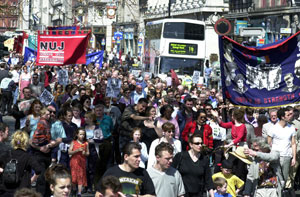26 April 2007 Edition
International Worker's Day 2007

Why we celebrate May Day
BY CAOILFHIONN Ní DHONNABHÁIN
May Day, or International Worker’s Day, is celebrated annually across the world on 1 May. It commemorates the historic, and continuing, struggle of workers to improve their rights and conditions.
The origins of May Day lie in the struggle for a shorter working day and in particular in the campaign in the United States in the 1880’s for the eight-hour working day. At the time workers were being forced to work ten, 12 and 14-hour days and a campaign of militant strike action and demonstrations was waged in support of the eight-hour day.
In Chicago, where there had been a particularly high level of support for the campaign, there was a brutal reaction from employers leading to the hanging of the Haymarket Martyrs.
A demonstration was held on 4 May 1886 at Haymarket Square to protest against the brutal attack by the police on a meeting of striking workers at McCormick Reaper Works on 3 May, where six workers were killed and many more wounded. The meeting was peaceful and about to conclude when the police launched an attack upon the assembled workers. A bomb was thrown into the crowd. A battle ensued at the end of which seven policemen and four workers were dead.
Eight anarchist trade unionists were arrested and charged with criminal conspiracy. There was no evidence that any of the men arrested had participated in the bombing. Four trade unionists – Albert Parsons, August Spies, Adolph Fischer and George Engel were hanged on trumped up charges. Three more – Michael Schwab, Samuel Fielden and Oscar Neebe, spent six years in prison before being pardoned. Another, Louis Lingg, committed suicide before the conclusion of the trial.
Since 1891, 1 May has become a day to commemorate the sacrifices, not just of the Haymarket Martyrs, but of all workers who fight on behalf of their class. Today, on May Day we recognise and celebrate the achievements and struggles of past generations of trade unionists. Those limited rights we enjoy at present we owe to workers in every part of the world who fought for those rights in a struggle in which many gave their lives.
Irish workers owe a particular debt to the 20,000 workers in Dublin who took part in the 1913 Lockout and to their 80,000 dependents who risked imminent destitution and starvation. This year, we also acknowledge the historic contribution made by the Catholic and Protestant Belfast dockers, who together under the leadership of James Larkin launched the trade union movement in the north and east of this country with their strike of 1907.
May Day gives us the opportunity to come together to demonstrate our ongoing commitment to socialism and the struggle to improve workers ‘rights. It gives us the opportunity to demonstrate our solidarity with the struggle of workers across the globe. On May Day we recognise and celebrate the achievements and struggles of past generations of trade unionists and commit ourselves to continue that fight.



